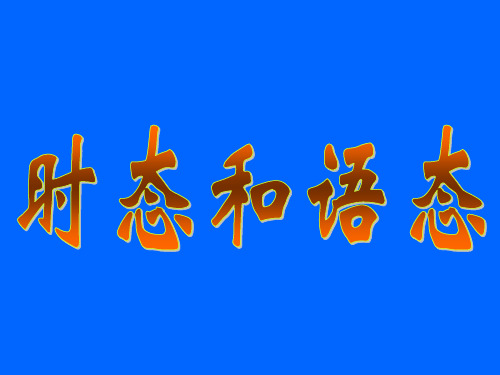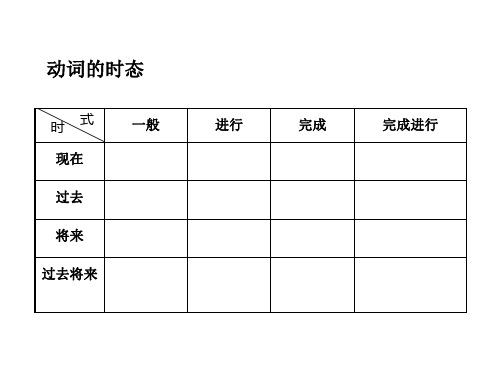英语语法一般过去时态ppt课件
合集下载
高中英语语法时态和语态课件(共69张PPT)

不能用 be+v-ing, be+v-ing表示将来,主要强调已经 作出的 安排,e.g. i’m pic you up at 6:00,don’t forget. ) ②强调某个意图是事先考虑好的:
--ann is in hospital.
--yes, i know. i’m going to visit her tomorrow.
--oh,really? i didn’t know. i’ll go and visit her. 2〕表示迹象表明要发生某事,则只能用be going to,e.g.
look at the dark clouds.it’s going to rain. 3〕be going to还有以下用法,e.g. ①强调主观想法或意图: i’m going to wash the car if i have time. (注意:此时
②It was then a small fishing village.
2.特别用法:
1〕表客气或委婉的现在:
①I wondered if you were free this evening.
②I thought you might like some flowers.
(注:过去进行时也可表示现在使语气更委婉、客气,eg.① I was wondering if you could give me a lift. ②We were hoping you would stay with us.能这样用的动 词主要限于want, wonder , think, hope, intend等少数 动词。)
②Someone has broken the window.(结果: 窗户仍破 着)
2〕持续性用法:该用法表示一个过去发生的动作在过去 并未在过去完成,而是持续到现在,且可能继续持续下去 或可能到此结束,e.g.
--ann is in hospital.
--yes, i know. i’m going to visit her tomorrow.
--oh,really? i didn’t know. i’ll go and visit her. 2〕表示迹象表明要发生某事,则只能用be going to,e.g.
look at the dark clouds.it’s going to rain. 3〕be going to还有以下用法,e.g. ①强调主观想法或意图: i’m going to wash the car if i have time. (注意:此时
②It was then a small fishing village.
2.特别用法:
1〕表客气或委婉的现在:
①I wondered if you were free this evening.
②I thought you might like some flowers.
(注:过去进行时也可表示现在使语气更委婉、客气,eg.① I was wondering if you could give me a lift. ②We were hoping you would stay with us.能这样用的动 词主要限于want, wonder , think, hope, intend等少数 动词。)
②Someone has broken the window.(结果: 窗户仍破 着)
2〕持续性用法:该用法表示一个过去发生的动作在过去 并未在过去完成,而是持续到现在,且可能继续持续下去 或可能到此结束,e.g.
初中英语语法 八大时态之一般过去时课件

They live in Shanghai . They lived in Shanghai last year.
I study in Beijing. I studied in Beijing .
she stops. she stopped.
I go to school by bike every day. I went to school by bike yesterday.
以e结尾的,直接在词尾加d dance - danced 辅音加y结尾,变y为i加ed study - studied 重读闭音节结尾,双写词尾字母加 ed stop - stopped 3.不规则变化: 没有变化 cut -cut put-put come-come hit-hit let-let 特殊情况 have/has—had, go---went, eat---ate, say—said
1
last year
时间
last week
标志 2 last weekend
The day before
3 。。。。。。
一般过去时
动词的变化
一般过去时-含有be动词的
• She is in Beijing.
She was in Beijing .
• I am a student.
I was a student.
read — read
write — wrote say — said
play — played
learn — learned buy — bought cry — cried
study — studied swim — swam walk — walked
一般过去时主要动词的变化:
I study in Beijing. I studied in Beijing .
she stops. she stopped.
I go to school by bike every day. I went to school by bike yesterday.
以e结尾的,直接在词尾加d dance - danced 辅音加y结尾,变y为i加ed study - studied 重读闭音节结尾,双写词尾字母加 ed stop - stopped 3.不规则变化: 没有变化 cut -cut put-put come-come hit-hit let-let 特殊情况 have/has—had, go---went, eat---ate, say—said
1
last year
时间
last week
标志 2 last weekend
The day before
3 。。。。。。
一般过去时
动词的变化
一般过去时-含有be动词的
• She is in Beijing.
She was in Beijing .
• I am a student.
I was a student.
read — read
write — wrote say — said
play — played
learn — learned buy — bought cry — cried
study — studied swim — swam walk — walked
一般过去时主要动词的变化:
一般现在时、过去时以及将来时(29张ppt)

[典例](2013·陕西高考)On Monday mornings it usually takes me an hour to drive to work although the actual distance is only 20 miles.
首页
上一页
下一页
末页
结束
南安六中高三英语语法课件(专用)
[以练促记]
want, wonder, think, hope,
I wish I
knew
(know)his namei.ntend等少数动词。
首页
上一页
下一页
末页
结束
南安六中高三英语语法课件(专用)
第一章 动词的时态和语态
[典例](2013·新课标全国卷Ⅱ)I didn’t realize then, but becoming a pilot makes me a better surgeon.
第一章 动词的时态和语态
[典例]They never drank wine. [以练促记] Every morning I_____t_o_o_k____(take)a walk when I was in the countryside.
[典例]I wondered if you could help me能. 这样有的动词主要限于
[以练促记] —When does the bus start?—It_____st_a_r_ts____(start) in 10 minutes.
首页
上一页
下一页
末页
结束
南安六中高三英语语法课件(专用)
第一章 动词的时态和语态
观看Flash演示 化难为简 一般现在时
英语语法16种时态介绍ppt课件

I'll write to you as soon as I arrive there. • 由if 引导的条件状语从句中可以用shall或will表
“意愿”,但不表示时态。
If you will accept my invitation and come to our party, my family will be pleased.如果你愿意接受并 参加我们的舞会,我的家人会非常高兴。
6)祈使句中 ( to give directions or instructions ) Go down the street, and then take the second turning on
the left.
知识扩展:一般现在时表将来
1)下列动词:come, go, arrive, leave, start, begin, return的一般 现在时表将来。这主要用来表示在时间上已确定或安排好的 事情 ( timetabled or fixed events )。 The train leaves at six tomorrow morning. When does the bus start? It starts in ten minutes.
You are always changing your mind. You are always doing well
He’s always asking the same question. 6. 状态动词的进行时后面接形容词brave; careful; stupid; clever; foolish; polite; kind; shy等时,为 主语所表现的非一般惯性特点或故意的行为。
6 )在the more…the more…句型中,从句也要用一 般现在时取代将来时。
“意愿”,但不表示时态。
If you will accept my invitation and come to our party, my family will be pleased.如果你愿意接受并 参加我们的舞会,我的家人会非常高兴。
6)祈使句中 ( to give directions or instructions ) Go down the street, and then take the second turning on
the left.
知识扩展:一般现在时表将来
1)下列动词:come, go, arrive, leave, start, begin, return的一般 现在时表将来。这主要用来表示在时间上已确定或安排好的 事情 ( timetabled or fixed events )。 The train leaves at six tomorrow morning. When does the bus start? It starts in ten minutes.
You are always changing your mind. You are always doing well
He’s always asking the same question. 6. 状态动词的进行时后面接形容词brave; careful; stupid; clever; foolish; polite; kind; shy等时,为 主语所表现的非一般惯性特点或故意的行为。
6 )在the more…the more…句型中,从句也要用一 般现在时取代将来时。
英语语法——一般过去时课件(共44张PPT)

例:Wendy was in the seventh grade last year. Was Wendy in the seventh grade last year?
肯否回答:
一般疑问句: Be动词(was/were)+主语+其他+?
肯定回答:Yes , 主语+ was/were. 否定回答:No , 主语+ wasn’t/weren’t . --- Was he at home yesterday ? ---他昨天在家吗? --- Yes , he was .是的,他在 --- No , he wasn’t . 不,他不在。
study — studied
carry— carried
5.不规则变化. (见不规则动词表P97)
be动词 的一般过去时
Please look at the sentences
我今年12岁. I _a_m_ 12 years old this year.
我去年11岁. I _w_a_s_ 11 years old last year.
实意动词的一般 过去时句子结构
每天,早餐我吃鸡蛋和牛奶。 I _h_av_e_ eggs and milk for breakfast every morning.
昨天,早餐我吃面条。
I _h_a_d_ noodles for breakfast yesterday morning.
他每天都吃水果。 He _h_a_s__ fruit every day.
1. I _______ at school now.
was 2. He ________ at the camp last week. were 3. We ________ students two years ago. were 4. They ________ on the farm a moment ago. was 5. Yang Ling ________ eleven years old last year. was 6. There ________ an apple on the plate yesterday. was 7. There ________ some milk in the fridge yesterday. was 8. The mobile phone _______ on the sofa yesterday evening.
肯否回答:
一般疑问句: Be动词(was/were)+主语+其他+?
肯定回答:Yes , 主语+ was/were. 否定回答:No , 主语+ wasn’t/weren’t . --- Was he at home yesterday ? ---他昨天在家吗? --- Yes , he was .是的,他在 --- No , he wasn’t . 不,他不在。
study — studied
carry— carried
5.不规则变化. (见不规则动词表P97)
be动词 的一般过去时
Please look at the sentences
我今年12岁. I _a_m_ 12 years old this year.
我去年11岁. I _w_a_s_ 11 years old last year.
实意动词的一般 过去时句子结构
每天,早餐我吃鸡蛋和牛奶。 I _h_av_e_ eggs and milk for breakfast every morning.
昨天,早餐我吃面条。
I _h_a_d_ noodles for breakfast yesterday morning.
他每天都吃水果。 He _h_a_s__ fruit every day.
1. I _______ at school now.
was 2. He ________ at the camp last week. were 3. We ________ students two years ago. were 4. They ________ on the farm a moment ago. was 5. Yang Ling ________ eleven years old last year. was 6. There ________ an apple on the plate yesterday. was 7. There ________ some milk in the fridge yesterday. was 8. The mobile phone _______ on the sofa yesterday evening.
初中英语语法—时态(28张) PPT课件 图文

(4)现在完成时与表示一段时间的for短语、since短语或从句等 时,应注意句中的谓语动词须是延续性的,而不能是非延续性动词,如 come→be here,go→be there,die→be dead,borrow→keep,buy→h ,join→be in,leave→be away,begin to study→study等。
6.过去进行时
(1)概念:表示过去某一时刻或某一时间段内正在进行的动作。 (2)构成形式:was/were+动词的-ing形式 ①表示往返、位移的动词的过去进行时常可用来表示过去将来时
时态 We wanted to tell her that the train was_leaving an hour later.
1.一般现在时
基本用法: (1)表示经常性、习惯性的动作; He always helps others. 他总是帮助别人。
时态 (2)表示现在的情况或状态;
He is a teacher. 他是个老师。 (3)表示客观事实和普遍真理。 The sun rises in the east. 太阳从东边升起。 构成形式:am/is/are或实义动词的原形(主语是第三人称单数时,动 词要用第三人称单数形式)。
时态 (2)构成形式:have/has+动词的过去分词。
(3)与现在完成时连用的时间状语有for a long time,recently,yet, lately,ever,never,already,since,by this time,before,just,in t past/last few years,since+过去的时间点,since+时间段+ago,since +从句(一般过去时)。
表示感觉的动词。如:see,hear等。 表示喜欢或厌恶的动词。如:like,love等。 表示希望的动词。如:want,would like等。
初中英语语法课件ppt
vacation together.
过去将来时的使用:
一、过去将来时表示对于过去某一时间而言将要发生的动 作或存在的状态。 would或was /were going to + V
would可用于各种人称。
二、would +V还可表示过去的习惯动作,在这点上同used to同义。
When we were children, we would/used to go swimming every summer.
e) 用于条件从句“如果……想,设想”(接近if ……want to,或 if ……should) 例:Greater efforts to increase agricultural production must be made if food shortage ____________ avoided. A) is to be B) can be C) will be D) has been
一般现在时的动词形式: 动词原形 1.am;is ;are 2.have,has 3.第三人称单数形式-(e)s
肯定句:I watch television every day.
否定句:I don’t watch television every day.
疑问句:Do you watch television every day.
一般现在时的使用:
1.一般现在时表示总是、通常、习惯 性的动作或状态。
It snows in winter. I watch television every day.
2.用于对客观事实的普遍性的陈述。
Water consists of hydrogen and oxygen. Most animals kill only for food. The world is round.
过去将来时的使用:
一、过去将来时表示对于过去某一时间而言将要发生的动 作或存在的状态。 would或was /were going to + V
would可用于各种人称。
二、would +V还可表示过去的习惯动作,在这点上同used to同义。
When we were children, we would/used to go swimming every summer.
e) 用于条件从句“如果……想,设想”(接近if ……want to,或 if ……should) 例:Greater efforts to increase agricultural production must be made if food shortage ____________ avoided. A) is to be B) can be C) will be D) has been
一般现在时的动词形式: 动词原形 1.am;is ;are 2.have,has 3.第三人称单数形式-(e)s
肯定句:I watch television every day.
否定句:I don’t watch television every day.
疑问句:Do you watch television every day.
一般现在时的使用:
1.一般现在时表示总是、通常、习惯 性的动作或状态。
It snows in winter. I watch television every day.
2.用于对客观事实的普遍性的陈述。
Water consists of hydrogen and oxygen. Most animals kill only for food. The world is round.
小升初 六年级英语语法 一般过去时 动词过去式 课件ppt
3.They _____ in the USA last year.They _____ in China
now.
A.are ; were B.were ; are
C.was ; are
D.were ; was
Listen carefully
4. 实意动词过去式的变化规则
I walk to school every day.
一起练练吧
写出下列动词的过去式
like -- ______
do -- ______
dry -- ______
drop -- ______
think -- ______
know -- ______
sit -- ______
sleep -- ______
Listen carefully
一起练练吧
用动词的适当形式填空。 1)I _____ (have) an interesting party last weekend. 2)He _____ (watch) TV and _____ (read) a useful book yesterday. 3)They all _____ (go) to the mountains yesterday morning. 4)His father _____ (be) a taxi driver five years ago. 5)I _____ (take) some pictures yesterday.
我们就不:listen -- listened open -- opened visit -- visited
Listen carefully
口 诀:
• 过去式很简单,前提必须是动词 • 结尾有e只加d • 辅y结尾也不难,把y变i加ed • 末尾双写有哪些,辅音元音辅音记 • 其他动词很随和,带上ed成过去
英语多媒体经典课件(ppt 34页)PPT学习课件
而否定句就是在谓语动词前面加上 didn’t 然后动词变成原型。
1. They had a meeting last week.
2. Miss Li got to school twenty minutes ago.
3. I did homework on Saturday afternoon. 1. They didn’t have a meeting last week.
不规则变化
come ---came can---could may --- might leave --- left
read --- read do ---did eat --- ate have --- had write ---wrote put ---put think --- thought hear --- heard
afternoon? 2) What did Tim do last Sunday
afternoon? 3) When did Tim play football?
• 过去时的特殊疑问句
• 1) My parents studied in the USA When
•
①
②
③
• they were young.
He played basketball. She went to school.
Please look at the following sentences
I am twelve years old.
I was eleven years old.
He is in Beijing now.
He was in Shanghai yesterday.
They are in China today.
小学英语小学英语语法课件-一般过去时 (共37张PPT) 全国通用
Presentation Sentences
一般过去时的主要用法和概念:一般过去时表示在过去某时 发生的动作或存在的状态,常与表示过去的时间状语 yesterday, last week, ago等连用。
一般过去时的用法: ① 表示过去时间里发生的动作或存在的状态,常与表示过去 的时间状语yesterday, last year, ago, the day before, yesterday, just now等连用。 ② 表示在过去一段时间里,经常性或习惯性的动作或状态, 常与always, often, usually等连用。
一般疑问句:a_t_t_h_e_l_iv_e__s_h_o_w_?_______________________ How many people were there at the
对划线部分提问:_l_iv_e__s_h_o_w_?________________________
Practice Oral Practice
Unit 11
Simple Past Tense 一般过去时
Warm up Presentation
Practice Production
Warm up
Free talking: What do you usually do on weekdays?
I usually get up at 6:00, I put on my clothes, make the bed, brush my teeth, wash my face. I have breakfast at 6:40, then wipe the table. I go to school at 8:00, and eat lunch at 12:00. Then I usually do my housework at 6:00, take a bath at 7:00, and watch TV at 7:45, and go to bed at 9:00.
- 1、下载文档前请自行甄别文档内容的完整性,平台不提供额外的编辑、内容补充、找答案等附加服务。
- 2、"仅部分预览"的文档,不可在线预览部分如存在完整性等问题,可反馈申请退款(可完整预览的文档不适用该条件!)。
- 3、如文档侵犯您的权益,请联系客服反馈,我们会尽快为您处理(人工客服工作时间:9:00-18:30)。
looked played started lived hoped used
stopped planned tripped
4、结尾是“辅音字母+y”的动词, study studied
先变“y”为“i”再加—ed
carry carried
4
规则动词词-ed的读音
清念 /t/ ,元浊/d/ ; /t/ /d/ 之后念/id/
3. stop 6. trip 9. want 12.have e 18.put 21.read
订正答案 返回1上0 页
动词过去式转换练习
答案
1. look looked 2. live lived 3. stop stopped
4. carry carried 5. hope hoped 6. trip tripped
6
用法 1、表示过去某个时间发生的动作或存在的状态。
He was here yesterday. I got up at six thirty yesterday morning. My father was at work yesterday afternoon. Did you have a good time last summer?
说明: 1、清念 /t/ ,即 ed 在清辅音后面念 /t/ ,例:finished helped
passed cooked 2、元浊 /d/ ,即 ed 在元音,浊辅音后面念 /d/ ,
例:borrowed enjoyed called moved
3、/t/ /d/ 之后念 /id/ , 即 ed 在 /t/ /d/ 音后面念 /id/ 例:wanted shouted needed count5ed
2
动词过去式 的构成
规则动词 不规则动词
构成 读音
3
规则动词过去式的构成
构成规则
例词
1、一般在动词原形末尾加– ed
2、结尾是 e 的动词加 -- d
3、末尾只有一个辅音字母的 重读闭音节词,先双写这 个辅音字母,再加—ed
look play start live hope use
stop plan trip
Review of the Simple Past Tense
一般过去时态
1
一般过去时
知识结构
构成 用法 常用时间
动词的过去式 (+ed)
1、表示过去某个时 间发生的动作或 存在的状态。
2、表示过去经常或 反复发生的动作。
yesterday last night in 1990 two days ago
用动词的过去式填空
1. Did you remember (remember) to buy
the oranges? 2.Who invented (invent) the computer. 3.We went (go) to the cinema last night. The
film was (be) very good. 4.What time did you get (get) to school this
morning? 5.Jim did (do) a lot yesterday. He went (go)
shopping and cooke返d回(上co页ok返) 回su练p习pe返r.回13 首页
一般过去时态练习
把下列句子改成相应时态
1. He usually gets up early in the morning. But____________________图标进入相应练习
动词过去式转换练习 一般过去时态练习
一般过去时态翻译练习
返回9首页
动词过去式转换练习
将下列动词变为过去式
1. look 4. carry 7. call 10.are 13.do 16.say 19.eat
2. live 5. hope 8. finish 11. go 14.get 17.see 20.take
______(be) very good. 4.What time _____ you ______(get) to school this
morning? 5.Jim _____ (do) a lot yesterday. He ______(go)
shopping and ______ (cook) supper. 12
7. call called 8. finish finished 9. want wanted
10.are were 11.go went 12.have had
13.do did 14.get got e came
16.say said 17.see saw 18.put put
19.eat ate
2、表示过去经常或反复发生的动作。 My father often went to work by bus last year. When I was a child, I often listened to music.
7
常用时间 常与一般过去时态连用的时间有:
yesterday yesterday morning (afternoon, evening…) last night (week, month, year…) two days ago, a week ago, three years ago… in 1990, (in 1998…)
am is are begin break bring build buy can
不规则动词表
was were began broke brought built bought could
catch come do draw drink drive eat fall
caught came did drew drank drove ate fell
20.take took 21.read read
返回上页 返回练习 返回11 首页
一般过去时态练习
用动词的过去式填空
1.____ you ____(remember) to buy the oranges? 2.Who ______(invent) the computer.
3.We _____(go) to the cinema last night. The film
